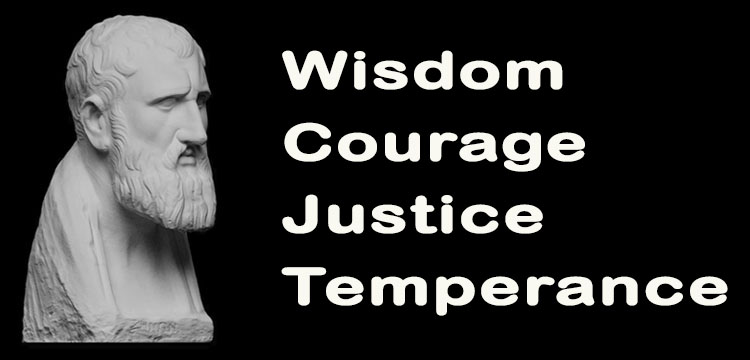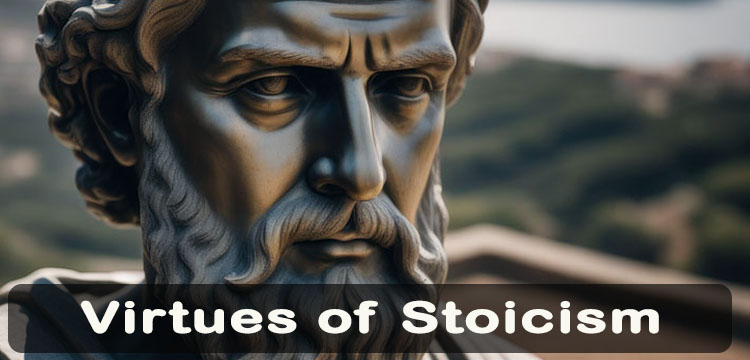Stoicism – 4 Virtues for a Life of Fulfillment and Justice
Delving into the philosophy of Stoicism reveals a timeless guide to a life filled with happiness and justice. Established by Zeno of Citium in Athens three centuries BC, the core values of Stoicism serve as pillars for a harmonious existence.
There are 4 pillars of Stoicism
- Wisdom
Better understand the world we live in. - Courage
The ability to act despite danger. - Justice
A desire for kindness. - Temperance
Self-discipline and self-control.
These four virtues form a whole – they constitute an ethical system. Over the centuries, Stoicism has improved! It is the Socratic ideals of Imperial Rome that remain the most powerful virtues of Stoicism today.

1. Wisdom – Navigating Life’s Complexity
At the heart of Stoicism lies wisdom, the cornerstone on which the other virtues stand. Embracing wisdom means grasping the intricacies of the world and knowing how to act in all situations, good and bad. A key concept of Stoicism is understanding what is within your control – and what is not. It comes down to how you react, which in reality is the only thing you can control. Stoics emphasize the power of reaction over external events, asserting that our responses shape our reality. It’s about finding the delicate balance between what truly matters and what doesn’t.
2. Courage – Embracing Fear as a Catalyst
Courage in Stoicism is not the absence of fear but the ability to act in the face of it. It involves confronting challenges, speaking one’s truth, and persevering with self-confidence. Stoic courage encourages resilience and steadfastness, urging individuals to uphold their beliefs and pursue what is right, regardless of the risks involved. Having courage also implies perseverance and self-confidence.
3. Justice – A Tapestry of Kindness
For followers of Stoic ideas, there is debate over which virtue is more important. For Marcus Aurelius, it was justice, but not from a legal point of view, but with regard to behavior in relation to others. In many ways, this concept has parallels with a desire for kindness. Stoics view the interconnectedness of all things. This means that justice extends beyond the individual. It urges us to consider the well-being of others, even those distant from us. True justice, for Stoics, involves a broad perspective that transcends immediate concerns.
4. Temperance – Mastering Self-Discipline
Often misunderstood, temperance in Stoicism translates to moderation, self-discipline, and self-control. In Aristotelian ethics, moderation is the golden mean, or the golden mean between two vices. Stoics caution against excess and desire. The crux of temperance lies in navigating challenging situations with emotional restraint, allowing reason to guide actions and preventing impulsiveness. In other words, it is knowing how to let yourself be guided by reason rather than emotion.
Greek and Roman Roots
As humanity grappled with questions about the optimal way to live within society, the evolution of civilizations brought forth profound reflections on existence. Among these, the Greeks and Romans made unparalleled contributions to the foundations of philosophical thought, with Stoicism standing out as one of the most pragmatic schools of thinking.

Marcus Aurelius
While the Romans shared similarities with other civilizations, their philosophical approach, particularly in ancient Rome, bore a distinctive pragmatism. Stoicism, reaching its peak of influence, found a powerful advocate in Marcus Aurelius, the 2nd-century Emperor of Rome. Aurelius’s writings now serve as a crucial source of insight into the virtues of Stoicism.
Socrates
Central to Stoicism is an ethical system rooted in the traditions of Socrates, a luminary in the history of philosophy. Socrates, a 5th-century BC Greek philosopher, left no written records of his teachings, yet his impact endured through the works of his students, notably Plato. Socratic methods, characterized by questioning to stimulate critical thinking, positioned Socrates as the father of ethical reflection and a potential precursor to Stoicism.
Key Quotes from Socrates
Know yourself and you will know the universe and the gods.
I am neither Athenian nor Greek, but a citizen of the world.
An unexamined life is not worth living.
Is there anything more precious to man than health?
I know that I am intelligent, because I know that I know nothing.
Origins of the Virtues of Stoicism
In 3rd century BC Athens, the Stoics took their name from the Stoa, a public passage in which Zeno’s disciples gathered to discuss philosophy. It was thanks to Zeno that Stoicism began to gain momentum. While Zeno established the foundations of Stoicism, it was Chrysippus of Soles who placed Stoic philosophy on firmer foundations. Chrysippus had a major role in the development of Stoic ideas, earning the title of the second founder. Over the centuries, as Roman influence grew, Stoicism gradually entered Rome. It was mainly thanks to Marcus Aurelius that Stoicism became a major philosophy in the life of the Romans.
Ethics of the Virtues of Stoicism
Stoicism gained popularity during Antiquity, particularly in Rome, where practical ethics took precedence. The virtues, a harmonious blend between an elitist conception of virtue and a minimalist approach, drew inspiration from Socratic principles; wisdom, courage, justice, and temperance. For Stoics such as Marcus Aurelius, the goal of philosophy was the application of the four virtues of Stoicism in practical ethics. It was a study on the best way to live life.
Principles of Applied Stoicism
- Act to advance our personal interests.
- Recognize that other people also have interests.
- Seek to resolve life’s problems that arise from friction between the first two principles.
Achieving the right balance requires applying the four virtues of wisdom, courage, justice, and temperance. Temperance and courage guide personal pursuits, justice extends care to others, and wisdom manages inevitable conflicts. To form a virtuous whole, the four pillars of Stoicism must unify.
Unifying the Virtues of Stoicism
In Stoicism, the virtues, when unified, serve as the sole requisites for a fulfilling and virtuous life, especially concerning happiness and love. By deciphering the psychological mechanisms of Stoicism, one can undergo a transformative journey, transitioning from negative emotions to a state of freedom and intrinsic happiness.
Stoicism Quotes
Quotes from esteemed Stoics, such as Marcus Aurelius, provide beacons for free thinking, offering perspectives that reshape life’s narratives. Stoicism, known for its accessibility, particularly appeals to individuals capable of distancing themselves from rigid doctrines.
Key Quotes from Marcus Aurelius
He who lives in harmony with himself lives in harmony with the universe.
Very little is needed to make a happy life; it is all within yourself, in your way of thinking.
When you wake up in the morning, tell yourself: The people I deal with today will be meddling, ungrateful, arrogant, dishonest, jealous, and surly. They are like this because they can’t tell good from evil.
Do not act as if you were going to live ten thousand years. Death hangs over you. While you live, while it is in your power, be good.
The happiness of your life depends upon the quality of your thoughts.
Key Expressions from Stoicism
We have two ears and one mouth, so we should listen more than what we say.
Freedom is only possible in a country where law prevails over passions.
Through silence, I hear the imperfections of others and I hide my own.
It’s better to stumble with your feet than with your tongue.
Man conquers the world by conquering himself.
Last Updated on February 16, 2024

